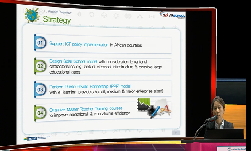A resident is a preliminary specialist with a medical license. It is also the status of an employee at a training hospital who is trained by clinical faculty. This duality makes the role of a resident unique, because its interpretation differs dramati...
http://chineseinput.net/에서 pinyin(병음)방식으로 중국어를 변환할 수 있습니다.
변환된 중국어를 복사하여 사용하시면 됩니다.
- 中文 을 입력하시려면 zhongwen을 입력하시고 space를누르시면됩니다.
- 北京 을 입력하시려면 beijing을 입력하시고 space를 누르시면 됩니다.
https://www.riss.kr/link?id=A106833679
-
저자
정수민 (삼성서울병원)
- 발행기관
- 학술지명
- 권호사항
-
발행연도
2019
-
작성언어
Korean
-
주제어
전공의 ; 전공의 교육 ; 입원전담전문의 ; 병동의학 ; Internship and residency ; Education ; Hospitalists ; Hospital medicine
-
등재정보
KCI등재,SCOPUS,ESCI
-
자료형태
학술저널
-
수록면
72-77(6쪽)
-
KCI 피인용횟수
4
- DOI식별코드
- 제공처
-
0
상세조회 -
0
다운로드
부가정보
다국어 초록 (Multilingual Abstract)
A resident is a preliminary specialist with a medical license. It is also the status of an employee at a training hospital who is trained by clinical faculty. This duality makes the role of a resident unique, because its interpretation differs dramatically depending on whether one focuses on a resident’s status as a trainee or as an employee. Issues regarding patient safety have emerged as residents have come to emphasize their role as employees in discussions of how to balance their work duties with their learning responsibilities. The workload that was taken for granted is no longer considered natural. Two years have elapsed since the enactment of the resident law, which was passed to improve the training environment and working conditions of residents, and limits them to 80 hours of work per week. However, confusion persists in the field. In order to solve problems regarding resident education, new education program with hospitalists and the financial and administrative support from hospitals and the government are important.
참고문헌 (Reference)
1 Choi KS, "Why internal medicine residents do not welcome a three-year program"
2 Lee JH, "Training hospitals say that how long the hospital will be burdened with training expenses for resident"
3 Shin JH, "Surgical resident training period will be shortened from 4 to 3 years from next year"
4 Jeon MO, "Still far away the resident law"
5 Asch DA, "Resident duty hours and medical education policy : raising the evidence bar" 376 : 1704-1706, 2017
6 Joh W, "Recruitment of 2019 resident"
7 Bilimoria KY, "National cluster-randomized trial of duty-hour flexibility in surgical training" 374 : 713-727, 2016
8 "Korean Intern Resident Association" Korean Intern Resident Association
9 Asch DA, "Innovation in medical education" 371 : 794-795, 2014
10 Philibert I, "Duty-hour limits and patient care and resident outcomes : can high-quality studies offer insight into complex relationships" 64 : 467-483, 2013
1 Choi KS, "Why internal medicine residents do not welcome a three-year program"
2 Lee JH, "Training hospitals say that how long the hospital will be burdened with training expenses for resident"
3 Shin JH, "Surgical resident training period will be shortened from 4 to 3 years from next year"
4 Jeon MO, "Still far away the resident law"
5 Asch DA, "Resident duty hours and medical education policy : raising the evidence bar" 376 : 1704-1706, 2017
6 Joh W, "Recruitment of 2019 resident"
7 Bilimoria KY, "National cluster-randomized trial of duty-hour flexibility in surgical training" 374 : 713-727, 2016
8 "Korean Intern Resident Association" Korean Intern Resident Association
9 Asch DA, "Innovation in medical education" 371 : 794-795, 2014
10 Philibert I, "Duty-hour limits and patient care and resident outcomes : can high-quality studies offer insight into complex relationships" 64 : 467-483, 2013
11 Jeong SW, "Case big 5 accusations and hospital survey"
12 Lee JH, "After 3 years of internal medicine, the stabilizer folded: surgery is far away"
동일학술지(권/호) 다른 논문
-
- 대한의사협회
- 김예정
- 2019
- KCI등재,SCOPUS,ESCI
-
- 대한의사협회
- 김상하
- 2019
- KCI등재,SCOPUS,ESCI
-
- 대한의사협회
- 손주혁
- 2019
- KCI등재,SCOPUS,ESCI
-
- 대한의사협회
- 이상욱
- 2019
- KCI등재,SCOPUS,ESCI
분석정보
인용정보 인용지수 설명보기
학술지 이력
| 연월일 | 이력구분 | 이력상세 | 등재구분 |
|---|---|---|---|
| 2024 | 평가예정 | 해외DB학술지평가 신청대상 (해외등재 학술지 평가) | |
| 2021-01-01 | 평가 | 등재학술지 선정 (해외등재 학술지 평가) |  |
| 2020-12-01 | 평가 | 등재 탈락 (해외등재 학술지 평가) | |
| 2013-10-01 | 평가 | 등재학술지 선정 (기타) |  |
| 2011-01-01 | 평가 | 등재후보학술지 유지 (기타) |  |
| 2007-01-01 | 평가 | SCOPUS 등재 (신규평가) |  |
학술지 인용정보
| 기준연도 | WOS-KCI 통합IF(2년) | KCIF(2년) | KCIF(3년) |
|---|---|---|---|
| 2016 | 0.33 | 0.33 | 0.48 |
| KCIF(4년) | KCIF(5년) | 중심성지수(3년) | 즉시성지수 |
| 0.5 | 0.57 | 0.815 | 0.12 |
연관 공개강의(KOCW)
-

Education Policy at the Party Conferences
Teachers TV Teachers TV -

Alcohol Education: Here's What We Want
Teachers TV Teachers TV -

Personal Finance Education: The Money Quiz
Teachers TV Teachers TV -

Early Sex Education: The Debate
Teachers TV Teachers TV -

2014 이러닝 국제 콘퍼런스 : What is the Lessons from Education Support Project~
한국교육정보진흥협회 Boseon, Kim





 KCI
KCI

